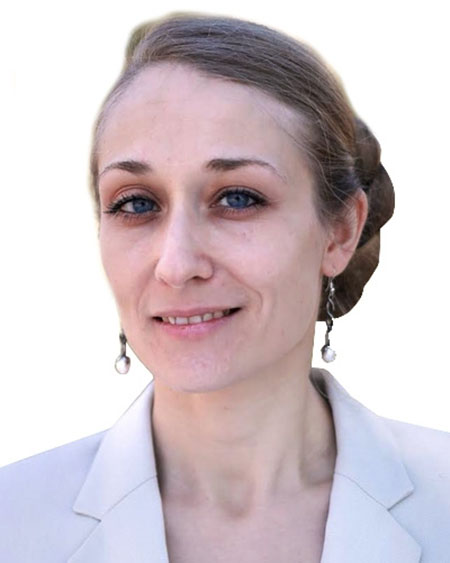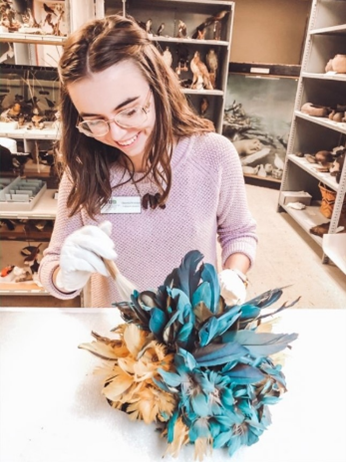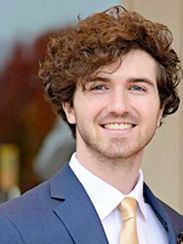Latin and Ancient Greek Language Group
We Invite:
- all levels are welcome!
- previous studies of Greek & Latin are great, but no experience required to join!
- To join contact Dr. Yuliya Minets, yminets@jsu.edu
Why Study Greek and Latin?
Because these languages:
- provide direct access to Classical culture, legacy of ancient Greeks and Romans
- boost memory and analytical skills
- teach self-discipline and perseverance
- train one to be attentive to details and to the context as a whole
- enable one to convert ideas into words and words into ideas with ease
- pave the way to successful studies of modern languages
- open greater opportunities for graduate studies and research in Classics, Ancient History, Medieval Studies, early Christianity, and many other fields
- are traditionally expected from future students of medical or law schools
- impress your potential employer
- can be a fancy entry point into a cocktail party conversation
Overall, the ability to master a classical language is a strong indicator of one’s ability to succeed in any study area or professional field
We Offer:
- a friendly and supportive group working together
- regular meetings, via zoom, once a week, time convenient for all
- learning languages through grammar explanations and translation practice
- occasional excurses into the cultural and political history of ancient Greece and Rome
- instructor’s professional feedback
- not a class: no intimidating tests, exams, quizzes, wordlist, deadlines, or grammar drills!
- additional individual consultations
Instructor: Dr. Yuliya Minets (yminets@jsu.edu) 
- Assistant Professor, Department of History and Foreign Languages
- PhD in History (2011); PhD in Early Christian Studies (2017)
- Taught Greek and Latin (various levels) at the University of Notre Dame (2020) and the University of Alabama (2017-2018)
- Research appointments with the Byzantine Studies Program at Dumbarton Oaks Research Library and Collection (Harvard University), Marco Institute for Medieval and Renaissance Studies (University of Tennessee, Knoxville), and Seeger Center for Hellenic Studies (Princeton University)
- Author of the book The Slow Fall of Babel: Languages and Identities in Late Antique Christianity (Cambridge University Press)
Current Participants
 Cheyenne Strickland:
Cheyenne Strickland:
My name is Cheyenne Strickland, and I joined this group to strengthen my Latin and Greek skills before graduate study. The work is challenging, engaging, and so much fun. It has helped me improve immensely in just a few weeks, so I highly recommend this group for anyone seeking to improve (or to learn!) Latin and Greek.
Anna Jungles:
I have always been interested in learning languages, whether ancient or modern, and I have taken classes or participated in faculty-led clubs for every language JSU offers. When Dr. Minets announced that she would be starting a Greek and Latin study group, I was excited about the opportunity to enhance my knowledge of Greek and to begin learning some Latin. I would love to see this study group grow in the future, possibly even to the point where the department can offer it as a class. JSU is a fantastic school, and I know students, specifically history and foreign language majors, will greatly benefit from this opportunity.
Melissa Evans:
My name is Melissa Evans and I heard about this group from a few friends who are also interested in ancient languages. I had self-taught myself Latin out of love for the language, but had almost no experience in Greek. Now, after joining, I am able to read Greek after only a few weeks and my Latin is able to stay fresh. If you or anyone you know is interested in ancient languages and has the desire to learn them, I would highly recommend this group!

Caelan Goss
Salvete! My name is Caelan Goss. I am a mathematics student, but I plan on going on to higher learning for ancient philosophy. This group has helped me to have a basic understanding in both Latin and Greek as well as their cultures and histories. I highly recommend this group to anyone with philological, historical, or philosophical interests!
In The News
Interview with Dr. Minets
1. What inspired you to start the Latin & Ancient Greek Language group?
This is a long story, but most important: I am your typical language nerd!
I am crazily excited about everything language is, about everything language can do, and everything we, humans, can do with language. My book, now forthcoming with the Cambridge University Press, is about languages and identities in Late Antiquity; in my everyday life, I am constantly code-switching between several modern languages; in my research, reading ancient texts and decoding their literal and historical meaning bring me the purest joy and the greatest excitement. The ancient languages I am working on include Greek, Latin, Syriac, Coptic, and Old Slavonic.
We all like to share our passions – whatever they are – with like-minded enthusiasts. So far, I have been lucky to teach languages – ancient and modern – on various levels, in several different settings, and for very diverse audiences. I greatly enjoy helping my students to master their skills and to experience these little miracles of “cracking” ancient texts. I am so happy to see them having their “aha!” moments – be it the discovery of the inner logic of language, the appreciation of the beauty and architecture of a sentence, the comprehension of the semantic spectrum of a word, or anything else.
I also know perfectly well that language learning rarely happens in solitude; this remains true even for languages that are usually passing as “dead”. It is possible to start learning an ancient language on one’s own, but it is quite difficult to stay on track and get a good grasp of Greek or Latin without a supportive group working together, regular meetings, instructor’s feedback, etc. JSU is a wonderful place in many ways – it is big enough to attract a sizable and diverse student population; the atmosphere is dynamic, active, and supportive. But there is no department of Classics and no department of Religious studies, for example; modern languages are represented only by French and Spanish. For me, as a new faculty member who just came here last year, it was a great privilege to see so many opportunities to contribute to JSU’s growth and development – to fill some of these gaps and not to step on anyone’s toes, so to say.
My biggest inspiration is, of course, my students. Last semester, I met a few incredibly smart, intelligent, and motivated JSU students and recent alumni. Our discussions of their research and career plans made obvious that, when it comes to graduate school applications in Classics, Ancient History, Medieval Studies, early Christianity, and many other adjacent fields, they are greatly disadvantaged for not having solid training in classical languages under their belt. This was the last call for me. So, here we are – doing our weekly Greek and Latin Study Group!
2. Why do you think people should join?
It is a truism to enlists various “whys” for studying Latin or ancient Greek. Google can easily pop up dozens of more or less legitimate suggestions. No, I do not realistically think you would need Latin in a modern-day medical or law school. Yes, I assume it still tends to impress your potential employer and can be a fancy entry point into a cocktail party conversation (in a post-COVID era, hopefully). Yes, I am aware that the very term “classical” should not be taken uncritically and should not imply, as has happened historically, the subliminal (de-)valuation of other periods, cultures, and languages. No, I do not think that the legacy and languages of ancient Greeks and Romans have lost their allure because of some darker sides of Western civilization.
On a more serious note, however, ancient languages boost memory and analytical skills; they teach self-discipline and perseverance; they train one to be attentive to details and to the context as a whole; to convert ideas into words, and words into ideas. The ability to master a classical language is a strong indicator of one’s ability to succeed in any study area or professional field, and the correlation is well-attested in scholarship.
Ancient languages pave the way to one’s successful studies of modern languages. Romance languages like French, Spanish, Italian, Portuguese are the most immediate example. Many years ago, I discovered that I was able to read academic articles in French before actually taking any classes in this language. The similarities with Latin were so overwhelming and obvious that it did not take much time to start navigating the text with some help of a dictionary. Yet, this goes beyond Romance languages. Latin provides a perfect instrument – an underlying matrix – to approach practically any Indo-European language. Once you understand the grammatical functions of cases, the architectonics of simple and complex sentences, case-number-gender agreements for modifiers, etc., you are in a much better shape to make progress with such languages as German or Russian, for example, which often pose a special challenge for Anglophone students since English has preserved only a very rudimentary case system. Moreover, to one’s utter surprise, Latin and Greek can give some important insights into the ways English works. The ability to reflect on one’s own or a foreign language is a key for developing mental flexibility and for the appreciation of diversity and variability.
Classical languages open greater opportunities for graduate studies and research in the fields of Classics, Ancient History, Medieval Studies, early Christianity, and many others. No serious scholarship is possible in these areas without an intimate familiarity with primary sources in their original languages. Teaching and education is another career avenue. There still are local private schools where Latin and Greek are part of the curriculum. If you plan to apply for a job in one of these places, I will be happy to be your reference (as I have been for some of my former students).
Those are just a few most obvious reasons why I think people may want to join. Last but not least, we are a friendly and supportive group. This is not a class, so there are no intimidating tests, quizzes, wordlist, deadlines, mechanistic grammar drills, etc. We are learning by engaging with a text. Mistakes are welcome, this is the way we learn!
I believe the group should be an especially attractive opportunity for those who have some previous experience with Latin and/or ancient Greek and are interested to continue, but all levels are welcome.
3. What does a typical meeting look like?
We usually joke and exchange some news and updates, academic or non-academic likewise, in a pretty informal manner, at the beginning of our meetings, before engaging in a closer reading and translation of whatever Greek or Latin texts or sentences we have for the day. Once we cover a certain grammar topic with sufficient depth, I explain a new topic, share a handout, and go through its content. Yet, I strongly believe that “practice makes perfect,” so we are quick to go back to translations to see how this new grammar theory works in real-life situations.
I periodically switch between Latin and ancient Greek to keep both languages on parallel tracks. This is an unusual approach, but I believe such a comparative perspective has its own undisputable advantages. The languages are similar enough to amplify, rather than impede, each other, and together they provide a better insight into the inner logic of Indo-European languages, making a strong foundation for further studies.
We discuss language mechanics, go back or forward in our grammar topics, and adjust the level of difficulty as needed. Occasional (and rewarding!) meanderings into the cultural and political history of ancient Greece and Rome are taking place, as well as certain puzzling over some moral maxims of ancient writers. I always try to allow students to finish translating a phrase or sentence without interrupting with immediate corrections; I ask questions or give prompts to let them clarify or correct themselves and bring up the best version of their own before providing my perspective.
4. Where do meetings take place?
We are currently holding our meetings online via zoom. The group meets once a week on Friday evenings for an hour and a half or a little bit more. This just happened to be the time convenient for most active participants, but we remain flexible and can adjust the time in the future if the need shall be. As we are growing consciously optimistic about the COVID situation, we may have some meetings in the regular classroom settings next semester, though there are no clear plans yet.
5. Are there any plans for the group that you can share?
As said above, from the very beginning, the group has had an ambitious and somehow unusual goal, namely, to study both classical languages – Greek and Latin – side by side, instead of focusing on only one of them. I plan to keep doing this for its obvious benefits.
I am looking forward to the moment when we cover the basic grammar in both languages and will be more flexible in choosing our primary source readings.
I also want to make this language group multi-generational (in terms of students’ generations) and attract neophytes every new semester. Maybe it will mean splitting the group into two levels, but we will see.
It will be lovely to have occasional social gatherings in addition to more language-focused meetings at some point if the COVID situation permits.
I do not have yet more ambitious plans, but someday, we may be participating in regional language competitions and students’ conferences in Classical studies, why not?

